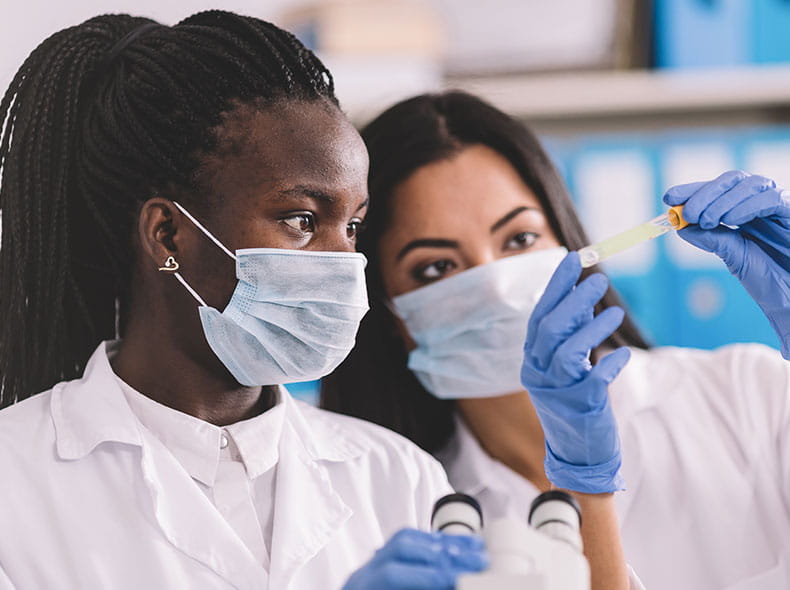
Cytopathology Fellowship
Join Geisinger’s Cytopathology Fellowship program and get hands-on experience with state-of-the-art technology — on a team that’s dedicated to your success.
About us
Does getting to the root of disease at the cellular level inspire you as a physician? We’re passionate about the science — and art — of cytopathology, and we’re eager to train fellows who share our commitment to using the latest technology and advanced techniques to help the people in our care. We’re also enthusiastic researchers who strive to expand the horizons of our profession.
Our Cytopathology Fellowship is a one-year ACGME-approved program that will provide you with in-depth training in diagnostic cytopathology in a unique multidisciplinary, subspecialty environment with a busy cytology and small biopsy service incorporating ancillary studies and innovative practices.
If you join our cytopathology program, you’ll train in a busy, state-of-the-art cytology laboratory that processes more than 30,000 gynecologic, 7,000 non-gynecologic and 4,500 fine needle aspiration (FNA) cases each year with over 4,000 rapid on-site evaluations and a busy pathologist-performed FNA clinic.
The lab is fully automated and uses Sure Path thin-layer technologies with computer-assisted primary screening and Thin Prep technologies for the cervical screening specimens.
You will also:
- Become skilled in the performance of FNA biopsies thanks to the rich, hands-on experience in our FNA clinic and Geisinger simulation center, with the ability to use ultrasound guidance.
- Participate in our telecytology ROSE service and provide on-site interpretations for FNAs and touch preparations being performed at our numerous radiology and endoscopic biopsy sites.
- Gain expertise in evaluating ancillary tests such as immunocytochemistry, flow cytometry, and molecular pathology. Learn from faculty that wrote a popular immunohistochemistry textbook, Handbook of Practical Immunohistochemistry: Frequently Asked Questions, which is now in its 3rd edition (2022).
- Join weekly tumor board conferences, where you will present cytology/small biopsy and pathology materials.
- Learn from our cytopathology faculty and others in our cytopathology board review, anatomic pathology grand rounds, didactic session that are part of our fellowship and residency programs, and outside faculty through guest lecturers and the American Society of Cytopathology webinar series.
- Participate in new or ongoing research projects and quality improvement projects with the goal of presenting an abstract at a national meeting.
We will help you grow throughout the fellowship. Perhaps the greatest asset we can offer our fellows is our team of dedicated, experienced faculty and staff. Your responsibilities will expand in tandem with your developing knowledge and skills, as you work closely with our expert cytotechnologists and cytopathologists, and other faculty. We love what we do. And we foster cytopathology fellows who share our enthusiasm for the field. So join us for a year and be part of our cytopathology family to grow as a cytopathologist prepared for the current practice of cytopathology.
About Geisinger
Geisinger serves more than 1 million people in central and northeast Pennsylvania. We’ve been nationally recognized for innovative practices in quality, delivery models such as ProvenCare® and the use of an award-winning electronic medical record, Epic®. Our physician-led system has about 24,000 employees, including nearly 1,700 physicians, 10 hospital campuses, two research centers and a health plan with more than half a million members, all of which boost our hometown economies by $7.1 billion annually.
Program overview
Geisinger's Cytopathology Fellowship consists of 12 months of training under the direct supervision of four board-certified cytopathologists.
Fellows participate in the daily activities of the cytopathology division, including reviewing cases to prepare them for sign-out with an attending cytopathologist. And to discuss the clinically relevant information, as well as any prior cases or concurrent patient materials. Fellows also oversee the completion and editing of final reports and incorporate evidence-based findings from the cytology literature. Fellows use our sophisticated laboratory information system, electronic medical record and other analytical databases that we use in daily operations of cytopathology.
You will also:
- Perform all requested clinic fine needle aspirations (FNAs) on palpable masses in our FNA clinic, with the ability to use ultrasound imaging
- Participate in rapid on-site evaluation (ROSE) for image-guided (CT and sonography) FNAs and small biopsies, which requires patient interaction and review of pertinent radiographs with the clinicians
- Allocate material for necessary ancillary studies and gain skill and confidence in the appropriate use and interpretation of studies in:
- Flow cytometry
- Immunocytochemistry
- Molecular pathology
- Have access to extensive educational and study set materials
- Gain extensive experience with gynecologic cytology by reviewing thin-layer preparations and HPV testing
- Rotate through the cytopreparatory area to master techniques for preparing cytology specimens
- Participate in our continuing quality improvement program, including cytology-surgical pathology correlation and CAP interlaboratory correlation
- Present pathology cases at multidisciplinary clinical conferences
- Participate in up to eight weeks of electives in topics including:
- Flow cytometry
- Molecular pathology
- Research
- Anatomic pathology subspecialties
- Clinical pathology subspecialties
- Informatics/laboratory management.
- Be on call for the FNA service during clinic hours, but there is no required night or weekend call for cytopathology fellows
At the end of your training, you’ll be a skilled, compassionate cytopathologist who would be an asset to any health system with a range of skills in areas like:
- Cytomorphology
- Laboratory management
- Informatics
- Ancillary studies
- Telecytology
- ROSE
- FNA technique
Plus, everything required to practice independently.

